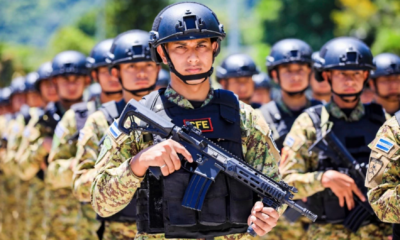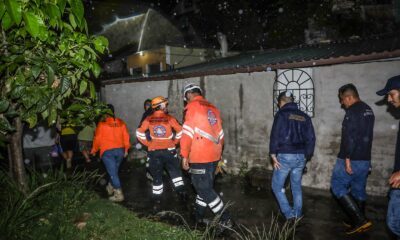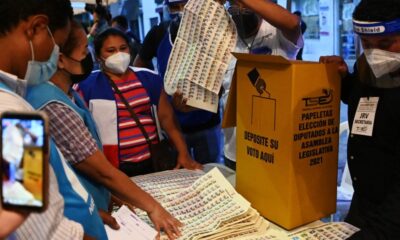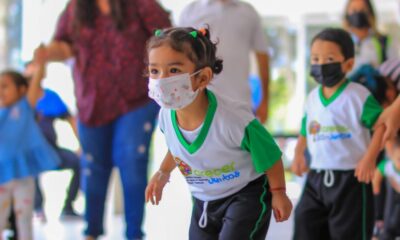Central America
U.S. pledges to continue promoting work visas for Salvadorans

February 16 |
The US ambassador to El Salvador, William Duncan, promised that the US government will continue to promote the H-2 work visa program, hand in hand with the Ministry of Foreign Affairs, so that even more salvadorans can apply for a temporary work stay in the North American nation.
Duncan attended this Wednesday to the interview day conducted by the Ministry of Foreign Affairs together with U.S. authorities in San Salvador. There are one thousand job openings in eight U.S. companies. The interviews began today and will end on Friday.
However, there will be more positions that will be opened this year. There are already more than 3,600 Salvadorans who have been able to work legally in the United States thanks to the bilateral impulse given to the H-2 visas. These individuals also have the opportunity to return for a new work season.
“These visas have the potential to change the lives of Salvadorans and is an important bet to provide legal migration options. Behind migration there is a strong desire to overcome a father, a mother, who is looking for a way to move their families forward. We are here now to tell them that there are legal and safe opportunities to work in the United States,” said Duncan.
The government of President Nayib Bukele has been able to reduce irregular migration of Salvadorans thanks to the Labor Mobility Program and hard work to improve security.
“Temporary work visas allow them to have access to a source of income without having to put their lives or those of their families at risk,” continued the U.S. representative.
For her part, the Vice Minister of Diaspora and Human Mobility, Cindy Mariella Portal, stressed that the Salvadoran government is committed to working with nations that “respect the sovereignty of our country and contribute to the welfare of the population.”
“Our vision of the country has been reformulated thanks to the government of President Nayib Bukele, who has prioritized the generation of opportunities in the most vulnerable areas of our country,” Portal highlighted.
This 2023 the joint work for the Labor Mobility Program will continue, said both officials.
The Foreign Ministry and USAID have created an employment exchange so that U.S. companies can choose profiles of Salvadoran workers. In addition, the Foreign Affairs team of El Salvador is in charge of managing the approach.
The job categories range from construction, bartenders, laundry, landscaping, cooks, masons, hotels, among others.
The Labor Mobility Program promotes circular migration. Portal reminded that the Foreign Ministry provides all the necessary support, including for the family of the selected person. When working in the United States, those selected also have the support of the consular network.
“To the workers, I wish them the best in their interview. If you are not selected, do not be discouraged, there will be even more opportunities. I assure you that we will continue to promote this type of initiatives hand in hand with the Ministry of Foreign Affairs and I want to thank Vice Minister Portal for her commitment to this program. We also appreciate the support of U.S. companies that continue to provide jobs to Salvadorans,” said Duncan, who also reflected that working in the United States in a legal and orderly manner “does not have to be impossible.
Central America
Laura Fernández Says She Will ‘Never’ Allow Authoritarianism in Costa Rica
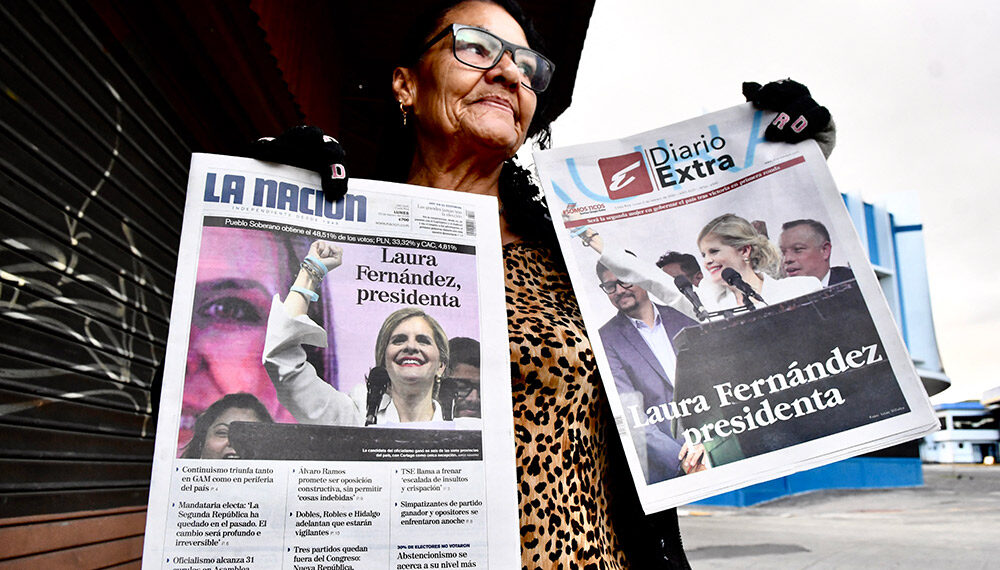
Costa Rica’s president-elect, right-wing leader Laura Fernández, said she will “never” allow authoritarianism under her government, in her first speech after winning Sunday’s presidential election.
Fernández, the political heir of outgoing President Rodrigo Chaves, has been accused by her opponents of seeking to steer the country toward authoritarian rule through her hardline proposals against drug trafficking and plans to reform state institutions.
“I, as the new president of the Republic, will never allow authoritarianism or arbitrariness—things that no one wants in Costa Rica,” Fernández said to cheers from her supporters gathered at a hotel in the capital.
The 39-year-old political scientist criticized her rivals for centering their campaign on what she described as a narrative of “authoritarianism and dictatorship.”
“They tried to scare voters, but the electorate did not fall into the trap,” she said.
Without offering details, Fernández acknowledged that her administration will seek to change the country’s “political rules of the game,” in what she described as a necessary step for Costa Rica, one of Latin America’s most stable democracies.
Central America
Costa Rica Goes to the Polls as Voters Choose Continuity or Change

Costa Ricans head to the polls today to elect the president of the republic and 57 members of the Legislative Assembly for the 2026–2030 term. Voters must choose between continuing the political project of outgoing President Rodrigo Chaves by supporting the ruling right-wing candidate Laura Fernández, or opting for a change in direction proposed by the opposition.
Fernández, representing the Pueblo Soberano Party (PPS), leads opinion polls with close to 40% of voting intention, bolstered by the outgoing president’s approval rating, which exceeds 50%. Chaves is barred from seeking immediate re-election under Costa Rican law.
Trailing far behind is Álvaro Ramos of the National Liberation Party (PLN), with less than 10% support. He is followed by Claudia Dobles of the Citizen Agenda Coalition (CAC), Fabricio Alvarado of New Republic (NR), and Ariel Robles of the Broad Front (FA), each polling between 3% and 5%. Undecided voters, who account for more than 30% of the electorate, could determine the outcome of the presidential race or force a runoff.
In a statement, Costa Rica’s Supreme Electoral Tribunal (TSE) reaffirmed its commitment to transparent and secure elections. “As has been the case for more than 76 years of democratic life in our country, the Supreme Electoral Tribunal guarantees all Costa Ricans that the national elections to be held this Sunday, February 1, will meet the highest standards of security and absolute transparency, allowing us to continue enjoying electoral processes in peace and freedom,” the institution said.
Authorities reported that 53,251 party observers will take part in the electoral process. Of these, 12,472 belong to the Social Christian Unity Party, 11,524 to Pueblo Soberano, 10,451 to the PLN, and 4,141 to the Citizen Agenda Coalition, among others. In addition, six political parties have sworn in 7,520 members of polling station boardsdeployed nationwide.
Central America
U.S. and Guatemala Sign Trade Deal Granting Zero Tariffs to Most Exports

The United States signed a reciprocal trade agreement with Guatemala on Friday, under which 70.4% of Guatemalan exports will enter the U.S. market tariff-free.
Guatemalan President Bernardo Arévalo highlighted the importance of the agreement, stating that it creates a framework of cooperation, certainty, and new opportunities for producers, workers, and entrepreneurs in the country. His remarks were shared in a video published on his official social media channels.
In 2025, 30.3% of Guatemala’s total exports were destined for the United States, amounting to approximately $4.3 billion. As a result, the agreement is expected to directly benefit key sectors of the Guatemalan economy, including agribusiness, manufacturing, and the textile industry.
“Today we have taken another step toward consolidating a country that, when it moves forward united, generates confidence, attracts investment, and creates real development opportunities for all its people,” Arévalo added.
The agreement with Guatemala follows a similar trade deal signed by the United States with El Salvador on Thursday, which includes the elimination of a 10% tariff on Salvadoran imports.
-

 International1 day ago
International1 day agoEpstein Denies Being ‘the Devil’ in Newly Released Video Interview
-

 International1 day ago
International1 day agoMexico to Send Humanitarian Aid to Cuba Amid U.S. Threats Over Oil Shipments
-

 International1 day ago
International1 day agoSpain Seeks to Ban Social Media Access for Children Under 16
-

 International1 day ago
International1 day agoPetro Resumes Extraditions, Sends Top Criminal to U.S. Before White House Talks
-

 International1 day ago
International1 day agoHypothermia Linked to Most Deaths During New York’s Recent Cold Spell
-

 Central America3 days ago
Central America3 days agoCosta Rica Goes to the Polls as Voters Choose Continuity or Change
-

 International1 day ago
International1 day agoMexico Arrests Suspect in Shooting of Sinaloa Lawmakers
-

 International9 hours ago
International9 hours agoDelcy Rodríguez Takes Control of Chavismo as Venezuela Enters a U.S.-Supervised Transition
-

 Central America1 day ago
Central America1 day agoLaura Fernández Says She Will ‘Never’ Allow Authoritarianism in Costa Rica
-

 International9 hours ago
International9 hours agoHRW Warns Trump’s Influence Has Weakened Human Rights in Latin America
-

 International1 day ago
International1 day agoNFL Investigating Emails Linking Giants Executive to Jeffrey Epstein





















































































